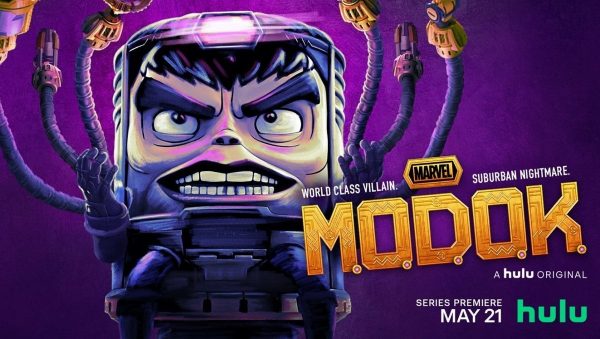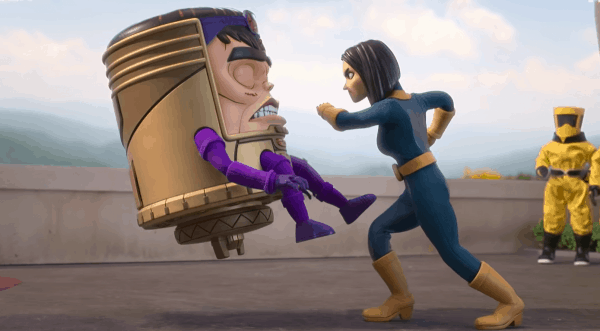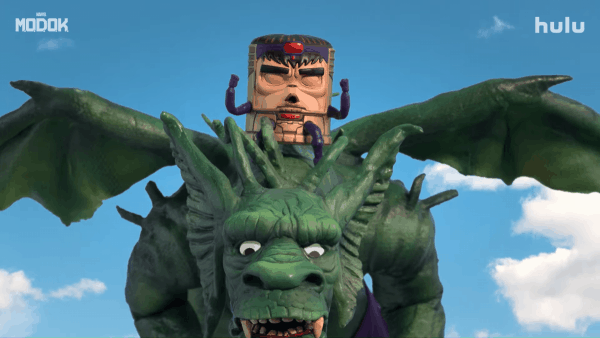Harrison Abbott reviews Hulu’s Marvel animated series M.O.D.O.K….
Without context, you’d be forgiven for dismissing M.O.D.O.K as nothing more than a Robot Chicken clone overlaid with Marvel theming. After all, it shares many core features with the long-running sketch series, including a penchant for lampooning movies, scatological humour, a few members of the voice cast, and even the same animation provider: Stoopid Buddy Stoodios.
Yet whilst their exteriors are near indistinguishable from one another, when you scratch beneath the surface you’ll realise that Robot Chicken and M.O.D.O.K are entirely different beasts. For a start, the latter is consistently funnier and much more heartfelt, recalling (at its best) the heyday of The Simpsons – albeit with added vulgarity. This is largely thanks to the deft oversight of Community alumnus Jordan Blum and his co-creator/ star Patton Oswalt, who are backed up here by a phenomenally talented writers room.
The ingenious premise is that we’ve been dropped into the later years of the Marvel Universe (Not quite the MCU, not quite the 616 continuity, but an amalgamation of the two). At this juncture in the timeline, everything has become rather mundane for both heroes and villains alike, with the titular Mobile Organism Designed Only for Killing (Oswalt) bearing the brunt of this malaise. When we first meet him, he’s essentially in the throes of a midlife crisis, reflecting on how he never managed to fulfil his childhood dreams of world domination.
The catalyst for M.O.D.O.K’s existential funk is one spectacularly bad day after Iron Man (Jon Hamm) foils one too many of his evil schemes. Upon retreating to his home base, the dastardly overlord is then informed by his beekeeper minions that the corporation, Advanced Idea Mechanics (A.I.M), is on the verge of bankruptcy, owing to years of reckless spending and a lack of profits. Another blow to his self-esteem follows shortly thereafter, when he discovers that his outlaw peers don’t respect him and that – as a final nail in the coffin – his neglected wife is planning on leaving. And she is taking custody of the kids!
Shell-shocked by these collective humiliations, M.O.D.O.K is forced to sign over A.I.M to a media conglomerate and move out of the house into a dingy apartment block. Having totally hit rock bottom, he must then figure out how to get his shit together. Whether it’s by committing to a philosophy of self-improvement, manipulating those around him, or screwing around with the space-time continuum. He is still a megalomaniacal supercriminal after all.
It’s such a fun idea: taking an established villain that no one really takes seriously and deconstructing him as a deadbeat loser. For context, the original version of M.O.D.O.K is a former scientist – named George Tarleton – who underwent an experimental procedure to artificially grow the largest brain in the world (hence the ludicrously oversized cranium). In exchange for heightened intelligence and psionic gifts, he traded in the use of his body and permanently confined himself to a hoverchair, from which he now puppeteers A.I.M.
Naturally, these increased cognitive abilities come part and parcel with a hyper-inflated ego and a general disdain for anyone George considers to be intellectually inferior to himself. Which is, of course, everybody. Oh, and he inexplicably refers to himself in the third person for no apparent reason as well.
In the show, the main bulk of this origin has been retained, only here it’s played for laughs. Watching the conceited M.O.D.O.K struggle to acclimatise to domestic life – where he can no longer unleash his death ray upon anyone who inconveniences him – is fertile ground for a sitcom and the writers mine it for all its worth.
As well as benefiting from a strong premise, the show also distinguishes itself as one of the better adult-oriented cartoons right now, by boasting sophisticated humour and actual jokes that have been constructed. You know, with proper set-ups and punchlines.
Indeed, M.O.D.O.K pleasingly distances itself from the likes of Family Guy, where repetitive gross-out shocks, incessant pop-culture references, and arduously drawn-out bits pass for wit. It’s a hard style of comedy to define but, for a rough idea of what to expect here, much of it feels like it’s been ripped straight from the classic era of The Simpsons, with clever fourth-wall-breaking ironies in the tradition of the ‘’Bort License Plate’’ gag.
Speaking of which, the writers seem to have adopted the same mentality as the scribes behind that immortal yellow family, whereby you craft a quality joke for every 10 seconds of air-time. Which means that, on the rare occasion a quip doesn’t land, it’s quickly followed up by a line that will leave you in stitches. By my rough estimation, I’d say you’re guaranteed at least two belly laughs and a consistent supply of chuckles per any given viewing.
Written down, these jokes would inevitably be robbed of their impact. Suffice it to say there are plenty of memorable highlights to choose from, including a jibe at the expense of post-grunge rockers, Hoobastank, a peek behind M.O.D.O.K’s bizarre financial outgoings and the dark implications of Cronenbergian mutants that are being cooked up in the A.I.M lab.
Whilst the scripts provide a witty foundation, it helps that the voice talent roster is also universally top-notch. Oswalt’s likeable performance renders our antihero genuinely sympathetic, even when he is doing or saying awful things, and his delivery of the character’s grandiose, third-person declarations about himself in mundane settings is always funny. Meanwhile, Beck Bennet does a fantastically sleazy job as Austin – the unbearably smug figurehead for A.I.M’s enigmatic board – and Sam Richards frequently steals the show as mistreated peon Gary, whose chipper responses to being horribly maimed never fail to get a chuckle.
The brilliant cast is rounded off by Brooklyn Nine-Nine’s Melissa Fumero (as M.O.D.O.K’s disaffected teenage daughter), Bill Hader in a smattering of minor roles, and even a guest spot from Nathan Fillion, who lends his voice to the pompous Wonder Man. Debatably the only weak link is the overly-zany Lou (Ben Schwartz), who dials up the quirkiness to such extremes that it can verge on being grating. Even then, you could argue that’s a deliberate choice and that the character is meant to be annoying, so it’s hardly a major issue.
Taken as a conventional sitcom then, M.O.D.O.K passes with flying colours, on account of a healthy hit-miss ratio. However, that’s not the only quality to recommend this show on, as it happens to be a legitimately compelling genre outing. More so than Falcon and the Winter Soldier, or the Defenders stuff from Netflix, this relishes the opportunity to play around in a Marvel sandbox. M.O.D.O.K’s family unit might be purely original (incidentally they have since been promoted to in-universe canon), but the show does bring to life some cult characters. For instance, there are unique interpretations of the scientist supreme, Monica Rappaccini, and her daughter Carmilla Black, alongside a hilariously pitiful version of the Super-Adaptoid (Jon Daly).
Outside those series regulars, there are plenty of other deep-cuts for Marvel aficionados to watch out for, such as the extraterrestrial dragon Fin Fang Foom, demented gamemaster Arcade, and fun allusions to the Roxxon corporation and chewable Pym Particles. That’s all in the first episode by the way! Stick around a bit longer and you’ll also be treated to appearances from the likes of Kang the Conqueror, perennial Hulk nemesis the Leader, Mr Sinister, The Brood, and Master Pandemonium. Not to mention a quick sojourn into Asgard’s sordid underbelly.
Thankfully, all of the above factor into the story in meaningful ways, instead of being relegated to blink-and-you’ll-miss-’em cameos or throwaway nods (ala Ready Player One). In fact, the peak of the whole season is an episode that zeroes in on this very aspect, wherein M.O.D.O.K attempts an ill-fated career rebound by forming a new supervillain team, one that’s comprised exclusively of washed-up Z-Listers. Riotous, and yet simultaneously overflowing with unexpected pathos, it gets a lot of mileage out of these obscure characters, to the point where they even make a welcome return in the series finale.
In general, M.O.D.O.K’s reworking of comic-book lore is consistently affectionate and hilarious. Even if you’re not completely au fait with the source material you’ll still appreciate what they’re doing here (although a few jokes do benefit from some Marvel literacy). You can really tell that it’s being handled by nerds who know this stuff inside-out and that all the recognisable IP isn’t being used as a mere crutch – for no other reason than because fans will eat it up.
On the contrary, I found myself more enthralled by the time-traveling, inter-dimensional exploits here than I have been by any superhero TV in a long time. Where one instalment sees us trekking across the nine realms, the next plunges us into the grisly heart of Murderworld, before yet another takes us into a dystopian vision of the future. The live-action Disney + content would benefit greatly by taking a leaf out of M.O.D.O.K’s book and embracing the dizzying potential of this massive universe.
For those who grew up obsessing over the pages of Chris Claremont and John Byrne, it weirdly feels like one of the most faithful adaptations of that specific era of comic-book publishing. It truly encapsulates the grand scale and high-concept plotting that often gets watered down in big-screen translations, and I was surprised by just how emotionally invested I became in the serialised narrative of a fucking M.O.D.O.K show. In fact, by the cliff-hanger ending, I found myself with more burning questions than I did after 9 weekly chapters of WandaVision. Hell, I was even somewhat moved by the sentimental moments, which are usually a turn off for me in sitcoms.
All in all, I was amazed by how much I ended up enjoying Hulu’s latest foray into the superhero genre. If I had a complaint, it would be that the show loses steam whenever it veers away from its uproarious protagonist (episode 7 particularly suffers from an Oswalt deficiency). On the other hand, that’s a testament to just how well written and performed he is throughout this series. I never thought I’d say this, but M.O.D.O.K has somehow developed into one of my favourite Marvel characters and I can’t wait to see where he goes next.
M.O.D.O.K is available to stream on Hulu in the U.S and Disney + in the UK and Canada.
Harrison Abbott

















